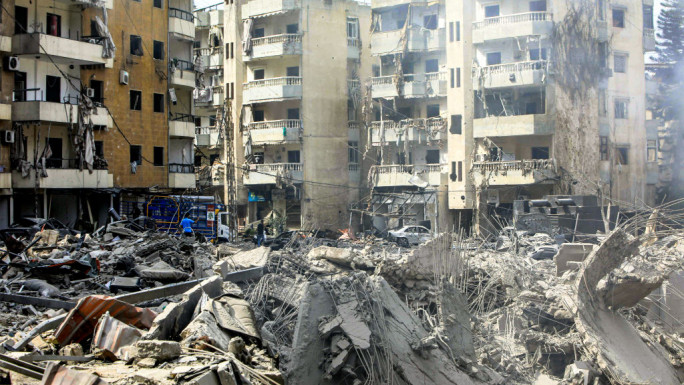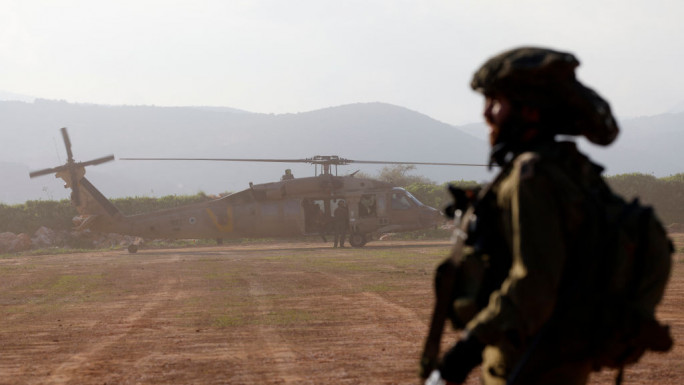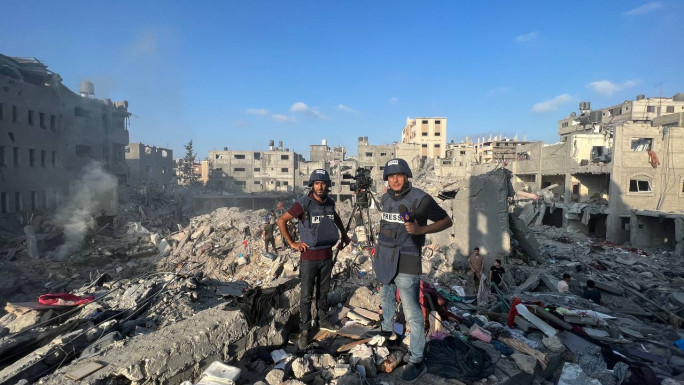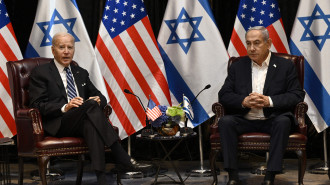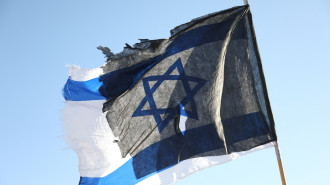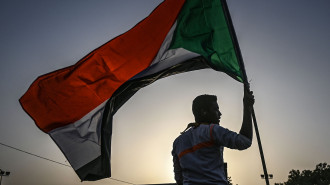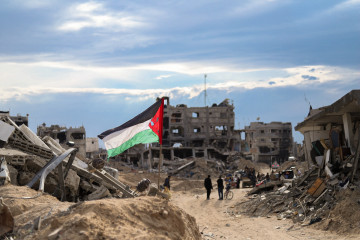
How Palestinians look back on 7 October a year later

A year on from the start of Israel’s deadliest war on Gaza, 54% of Palestinians say they support Hamas’ decision to launch attacks on Israel on 7 October 2023, which killed 1,200 Israelis, including soldiers and civilians.
This support has repeatedly been cited by Israel’s government to justify the mass killing of over 42,000 Palestinians in Gaza over the last 12 months, including 17,000 children, and the destruction of 70% of the besieged territory.
The International Court of Justice (ICJ) has found it plausible that Israel’s actions amount to genocide, while the International Criminal Court (ICC) has issued a request for arrest warrants for Israeli Prime Minister Benjamin Netanyahu, Israeli Defence Minister Yoav Gallant, as well for three Hamas leaders, including Yahya Sinwar, for alleged war crimes and crimes against humanity.
While used by Israel to justify the destruction of Gaza, Palestinian attitudes to Hamas’ attack reveal a more complex picture: what exactly do Palestinians support about that fateful day? Why? And in what context does this support occur?
No support for atrocities
The source for these figures, the Palestinian Center for Policy and Survey Research (PSR), notes in its poll conducted from 3-7 September in the West Bank and Gaza that support for Hamas’ attack among Palestinians “does not necessarily mean support for Hamas and does not mean support for any killings or atrocities committed against civilians”.
The PSR adds that almost 90% of the Palestinian public believes that Hamas militants did not commit alleged or documented atrocities on that day, and either attribute them to others present or question their genuineness.
The Hamas-led attack consisted of two waves, with the first consisting of elite Hamas militants, the Nukhba forces, that predominantly focused on Israeli military bases surrounding Gaza.
The second wave formed spontaneously once news of the attack broke in Gaza, and anyone with a gun rushed to the fence, including members of six other armed factions and non-Nukhba Hamas individuals, as well as criminal elements and curious spectators.
This wave had no central command, prior plans, coordination, or set goals, which prompted Hamas’ own leaders to acknowledge that “things went out of control”.
|
|
In that sense, two 7 Octobers have since emerged; one that Israel and its supporters see as “pure evil”, which focuses on the killing and kidnapping of civilians, and another that Palestinians voice support for; an attack on military targets that broke Israel’s image of invincibility.
That is why, Sara* a Palestinian lawyer, told The New Arab that she felt the attack was “a statement that tyranny and oppression have limits and consequences”.
Furthermore, for many Palestinians, despite the documented killings, the wave of attacks on Israeli Kibbutzim on 7 October is clouded by doubt over whether the entire narrative of the atrocities that took place was completely accurate.
This reflects the now debunked misinformation Israel’s government propagated, as well as Israeli reports of “numerous” incidents of friendly fire and the activation of the “Hannibal protocol”, which authorises the Israeli army to thwart suspected kidnapping attempts by killing everyone at the scene. Israel’s strict military censorship over what is allowed to be published is also a factor for many Palestinians.
That is why activist Khaled Zeidan says that the first thing that jumps to his mind when thinking about 7 October is Israeli misinformation. “Now after a year, I look back at all the misinformation that was spread after 7 October where some of it was promoted by President Biden, and I think how there was no effort to debunk or reverse or apologise for spreading lies,” he told The New Arab.
Many Palestinians voice opposition to the targeting of civilians, like Ahmed, whose entire family was killed in Israeli bombardments. “I’m against the targeting of civilians,” he told The New Arab. “The kidnapping of children, women, and the elderly should have never happened.”
Gaza's context of despair and deadlock
PSR also notes that 80% of Palestinians who support 7 October do so because it “has put the Palestinian issue at the center of attention and eliminated years of neglect”. This sentiment is shaped by a context of an unliveable status quo of illegal apartheid that Israel has imposed on Palestinians and deep disillusionment from the failure of non-violent alternatives.
Abu Suhaib, a Palestinian from Gaza, told The New Arab that Hamas’ attack “revived our struggle and brought global attention to our plight”. When asked about the immense destruction Israel had inflicted on Gaza since that day, he replied, "was the situation any better before? We were not alive under the siege. What future was waiting for us?"
When thinking about Hamas’ attack, many Palestinians cite a desperate necessity to disrupt an excruciating illegal 17-year-long siege on Gaza that rights groups and the UN repeatedly warned would render the enclave “uninhabitable” by 2020.
This slow suffocation has pushed many futureless yet highly educated youth to the brink of suicide. For some, the Islamic belief in eternal punishment is a lesser evil than permanent non-life in Gaza.
Palestinians also mention the profound sense of isolation and abandonment that preceded this war, where their self-determination was relegated to the sidelines of international discourse and seen as a mere hurdle on the path to Israeli-Arab normalisation, deepening the fear that their suffering would persist indefinitely.
That is why Essam, an activist currently in northern Gaza whose family was injured when their home was bombed, told The New Arab that “Gaza was subjected to great injustice over the years and the Palestinian cause was in the final moments of its liquidation until Hamas did what it did”.
Compounding this was an increased sense of existential threat under the most far-right government in Israel’s history, due to rising attacks by Israeli settlers and the Israeli army across the occupied West Bank and Israel’s largest land theft for settlements in decades.
Meanwhile, the years preceding the Gaza war, 2022 and 2023, were the deadliest for Palestinians since records began in 2005.
|
|
Israel's deliberate foiling of non-violent alternatives
Was Hamas’ attack on Israel the best course of action to disrupt an unliveable status quo? This is still an open question in internal Palestinian discourse, especially given the heavy price of the war on Gaza.
Many who believe it was do not automatically support Hamas or violence but rather point to how virtually every other strategy Palestinians have tried has failed to yield tangible results. The most profound disillusionment is that more than 30 years of negotiations have never birthed a Palestinian state.
Zaha Hassan, an analyst at the Carnegie Endowment in Washington, DC, told The New Arab that polling shows that for many Palestinians support for armed resistance today is linked to the failure of the Oslo peace process. Israel’s recent Knesset resolution rejecting a two-state solution and the establishment of a Palestinian state only bolster such disillusionment.
“If you have a peace process that is illegitimate and ineffective and you see outside your home an Israeli settlement expanding towards your house or you lost your house, obviously your support for a peace process is going to diminish considerably,” Hassan said. “You don't believe negotiations will lead to peace and you look for other mechanisms.”
Other nonviolent efforts have also led to dead ends. The Great March of Return protests in 2018-2019, which saw tens of thousands of unarmed Gazans protest weekly against Israel’s blockade, were met with lethal force. Israeli snipers injured and maimed over 30,000 protesters and soldiers bragged about how many Palestinian kneecaps they blew off, with one scoring 42 in one day. Over 250 Palestinians were killed.
“Israel is pushing Palestinians into the corner and making them feel they have nothing to lose,” the founder of the demonstration, Ahmed Abu Artema, told The New Arab. “Israel is dealing only with the security and military dimensions, but it’s overlooking the dimensions that create an environment that convinces people to resist.”
Palestinians have also repeatedly tried to knock on the doors of the UN and international courts, actions that Israel attacks as "diplomatic terrorism". Historical resolutions passed in favour of Palestinian rights have remained mere ink on paper, never to be implemented. European leaders admit, meanwhile, that the international community has failed Palestinians.
Slow death under Israel’s apartheid regime, compounded by deadlocked diplomatic avenues, leaves Palestinians with the conviction that there is nothing they can do to be treated as equal human beings. This despair then lends credence to armed resistance as a tool to disrupt the status quo, exact revenge, or counter intimidation.
Moreover, Western double standards in the generous and unwavering support for Ukraine and the glorification of its resistance as opposed to abandoning and victim-blaming Palestinians are cited among the reasons that popularise armed resistance and create a conviction towards taking matters into one’s own hands.
"Palestinians see Western support for Ukrainians resisting Russian occupation and aggression and wonder why the international community doesn't more actively push for an end to Israel's occupation of Palestinian land,” Hassan told The New Arab.
Experts, including Israelis themselves, believe the only way to reduce support for armed resistance is to create a better, genuine alternative, such as a credible diplomatic path for ending Israel’s illegal occupation.
Muhammad Shehada is a Palestinian writer and analyst from Gaza and the EU Affairs Manager at Euro-Med Human Rights Monitor.
Follow him on Twitter: @muhammadshehad2


